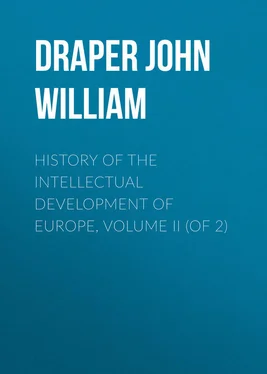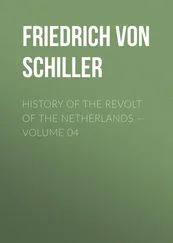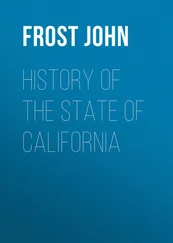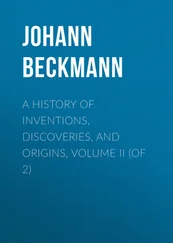John Draper - History of the Intellectual Development of Europe, Volume II (of 2)
Здесь есть возможность читать онлайн «John Draper - History of the Intellectual Development of Europe, Volume II (of 2)» — ознакомительный отрывок электронной книги совершенно бесплатно, а после прочтения отрывка купить полную версию. В некоторых случаях можно слушать аудио, скачать через торрент в формате fb2 и присутствует краткое содержание. Жанр: foreign_antique, foreign_prose, на английском языке. Описание произведения, (предисловие) а так же отзывы посетителей доступны на портале библиотеки ЛибКат.
- Название:History of the Intellectual Development of Europe, Volume II (of 2)
- Автор:
- Жанр:
- Год:неизвестен
- ISBN:нет данных
- Рейтинг книги:4 / 5. Голосов: 1
-
Избранное:Добавить в избранное
- Отзывы:
-
Ваша оценка:
- 80
- 1
- 2
- 3
- 4
- 5
History of the Intellectual Development of Europe, Volume II (of 2): краткое содержание, описание и аннотация
Предлагаем к чтению аннотацию, описание, краткое содержание или предисловие (зависит от того, что написал сам автор книги «History of the Intellectual Development of Europe, Volume II (of 2)»). Если вы не нашли необходимую информацию о книге — напишите в комментариях, мы постараемся отыскать её.
History of the Intellectual Development of Europe, Volume II (of 2) — читать онлайн ознакомительный отрывок
Ниже представлен текст книги, разбитый по страницам. Система сохранения места последней прочитанной страницы, позволяет с удобством читать онлайн бесплатно книгу «History of the Intellectual Development of Europe, Volume II (of 2)», без необходимости каждый раз заново искать на чём Вы остановились. Поставьте закладку, и сможете в любой момент перейти на страницу, на которой закончили чтение.
Интервал:
Закладка:
Hildebrand resolves on a reform.Scarcely was Hildebrand Pope Gregory VII. when he vigorously proceeded to carry into effect the policy he had been preparing during the pontificates of his predecessors. In many respects the times were propitious. The blameless lives of the German popes had cast a veil of oblivion over the abominations of their Italian predecessors. Hildebrand addressed himself to tear out every vestige of simony and concubinage with a remorseless hand. That task must be finished before he could hope to accomplish his grand project of an ecclesiastical autocracy in Europe, with the pope at its head, and the clergy, both in their persons and property, independent of the civil power. Necessity of celibacy of the clergy.It was plain that, apart from all moral considerations, the supremacy of Rome in such a system altogether turned on the celibacy of the clergy. If marriage was permitted to the ecclesiastic, what was to prevent him from handing down, as an hereditary possession, the wealth and dignities he had obtained. In such a state of things, the central government at Rome necessarily stood at every disadvantage against the local interests of an individual, and still more so if many individuals should combine together to promote, in common, similar interests. But very different would it be if promotion must be looked for from Rome – very different as regards the hold upon public sentiment, if such a descent from father to son was absolutely prevented, and a career fairly opened to all, irrespective of their station in life. To the Church it was to the last degree important that a man should derive his advancement from her, not from his ancestor. In the trials to which she was perpetually exposed, there could be no doubt that by such persons her interests would be best served.
It is enforced.In these circumstances Gregory VII. took his course. The synod held at Rome in the first year of his pontificate denounced the marriage of the clergy, enforcing its decree by the doctrine that the efficacy of the sacraments altogether depended on their being administered by hands sinless in that respect, and made all communicants partners in the pastoral crime. The pope seeks the friendship of the Normans.With a provident foresight of the coming opposition, he carried out the policy he had taught his predecessors of conciliating the Normans in the south of Italy, though he did not hesitate to resist them, by the aid of the Countess Matilda, when they dared to touch the possessions of the Church. It was for the sake of this that the Norman invasion of England under William the Conqueror had already been approved of, a consecrated standard and a ring containing a hair from the head of St. Peter sent him, and permission given for the replacement of Saxon bishops and other dignitaries by Normans. It was not forgotten how great had been the gains to the papacy, three centuries before, by changing the dynasty of the Franks; and thus the policy of an Italian town gave a permanent impress to the history of England. Hildebrand foresaw that the sword of the Italian-Norman would be wanted to carry out his projected ends. He did not hesitate to authorize the overthrow of a Saxon dynasty by the French-Norman, that he might be more sure of the fidelity of that sword. Without the countenance of the pope, the Norman could never have consolidated his power, nor even held his ground in England.
The conflict concerning investitures.From these movements of the papacy sprang the conflict with the Emperors of Germany respecting investitures. The Bishop of Milan – who, it appears, had perjured himself in the quarrel respecting concubinage – had been excommunicated by Alexander II. The imperial council appointed as his successor one Godfrey; the pope had nominated Atto. Hereupon Alexander had summoned the emperor to appear before him on a charge of simony, and granting investitures without his approbation. While the matter was yet in abeyance, Alexander died; but Gregory took up the contest. A synod he had assembled ordered that, if any one should accept investiture from a layman, both the giver and receiver should be excommunicated. The pretence against lay-investiture was that it was a usurpation of a papal right, and that it led to the appointment of evil and ignorant men; the reality was a determination to extend papal power, by making Rome the fountain of emolument. Gregory, by his movements, had thus brought upon himself three antagonists – the imperial power, the Italian nobles, and the married clergy. The latter, unscrupulous and exasperated, met him with his own weapons, not hesitating to calumniate his friendship with the Countess Matilda. It was also suspected that they were connected with the outrage perpetrated by the nobles that took place in Rome. Outrage on Hildebrand.On Christmas night, A.D. 1075, in the midst of a violent rain, while the pope was administering the communion, a band of soldiers burst into the church, seized Gregory at the altar, stripped and wounded him, and, haling him on horseback behind one of the soldiers, carried him off to a stronghold, from which he was rescued by the populace. But, without wavering for a moment, the undaunted pontiff pressed on his conflict with the imperial power, summoning Henry to Rome to account for his delinquencies, and threatening his excommunication if he should not appear before an appointed day. In haste, under the auspices of the king, a synod was assembled at Worms; charges against the pope of licentious life, bribery, necromancy, simony, murder, atheism, were introduced and sentence of deposition pronounced against him. On his side, Gregory assembled the third Lateran Council, A.D. 1076, placed King Henry under interdict, absolved his subjects from allegiance, and deposed him. He defines the position of the Church,A series of constitutions, clearly defining the new bases of the papal system, was published. They were to the following effect: "That the Roman pontiff can alone be called universal; that he alone has a right to depose bishops; that his legates have a right to preside over all bishops in a general council; that he can depose absent prelates; that he alone has a right to use imperial ornaments; that princes are bound to kiss his feet, and his only; that he has a right to depose emperors; that no synod or council summoned without his commission can be called general; that no book can be called canonical without his authority; that his sentence can be annulled by none, but that he may annul the decrees of all; that the Roman Church has been, is, and will continue to be infallible; that whoever dissents from it ceases to be a catholic Christian, and that subjects may be absolved from their allegiance to wicked princes." The power that could assert such resolutions was near its culmination.
And now was manifest the superiority of the spiritual over the temporal power. The quarrel with Henry went on, and, after a hard struggle and many intrigues to draw the Normans over to him, that monarch was compelled to submit, and in the depth of winter to cross the snowy Alps, under circumstances of unparalleled hardship, to seek absolution from his adversary. and overcomes the King of Germany.Then ensued the scene at Canosa – a penitent in white raiment standing in the dreary snow of three winter days, January 1077, cold and fasting at the gate, seeking pardon and reconciliation of the inexorable pontiff; that penitent was the King of Germany. Then ensued the dramatic scene at the sacrament, in which the gray-haired pontiff called upon Heaven to strike him dead on the spot if he were not innocent of the crimes of which he had been accused, and dared the guilty monarch to do the same.
Conclusions from these events.Whoever will reflect on these interesting events cannot fail to discern two important conclusions. The tone of thought throughout Europe had changed within the last three ages; ideas were entertained, doctrines originated or controverted, a policy conceived and attempted altogether in advance of the old times. Intellect, both among the clergy and the laity, had undergone a great development. But the peculiar character of the papal power is also ascertained – that it is worldly, and the result of the policy of man. The outrage on Hildebrand shows how that power had diminished at its centre, but the victory over Henry that it maintained its strength at a distance. Natural forces diminish as the distance increases; this unnatural force displayed an opposite property.
Читать дальшеИнтервал:
Закладка:
Похожие книги на «History of the Intellectual Development of Europe, Volume II (of 2)»
Представляем Вашему вниманию похожие книги на «History of the Intellectual Development of Europe, Volume II (of 2)» списком для выбора. Мы отобрали схожую по названию и смыслу литературу в надежде предоставить читателям больше вариантов отыскать новые, интересные, ещё непрочитанные произведения.
Обсуждение, отзывы о книге «History of the Intellectual Development of Europe, Volume II (of 2)» и просто собственные мнения читателей. Оставьте ваши комментарии, напишите, что Вы думаете о произведении, его смысле или главных героях. Укажите что конкретно понравилось, а что нет, и почему Вы так считаете.












